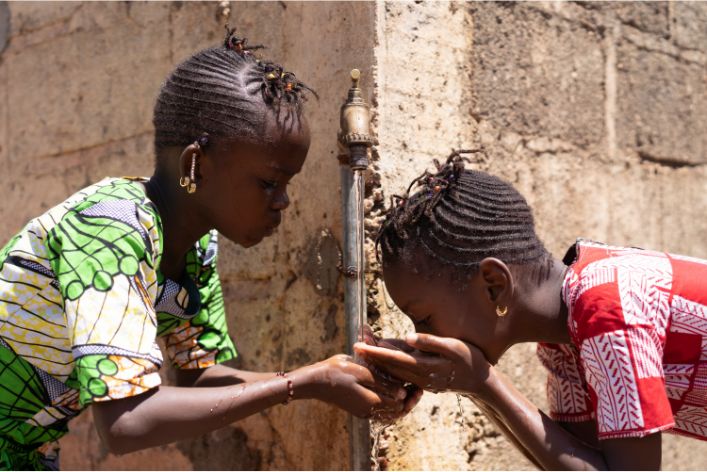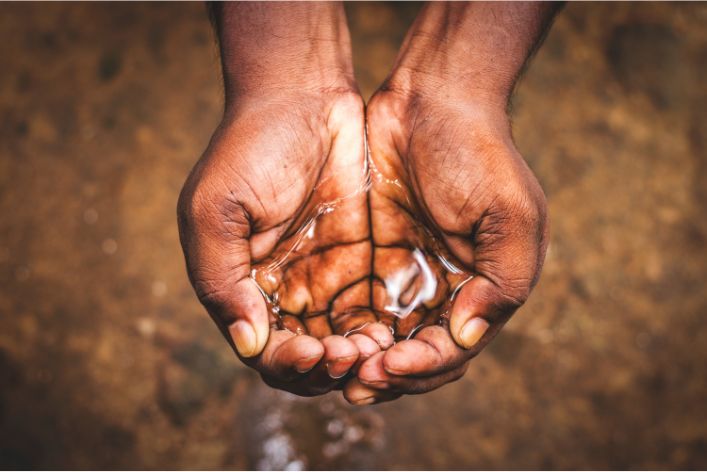Last Updated on May 25, 2023
Water crisis in Africa is a pressing issue that has been affecting the continent for decades. With over 300 million people lacking access to safe drinking water and sanitation facilities, the situation is dire. Finding sustainable solutions is of utmost importance to ensure that this crisis is addressed and that future generations have access to clean water.

The demand for water in Africa is also increasing as the population is expected to double by 2050. This means that the crisis is only going to worsen if nothing is done. However, there is hope as innovative solutions are emerging to tackle the water crisis. In this blog post, we will explore some of the sustainable solutions for Africa’s water crisis.
Causes of Africa’s Water Crisis
Climate changes
Climate change has led to irregular rainfall patterns that have made it challenging to predict when it will rain, how hard it will, and how long it will last. This unpredictability has made it challenging for farmers to plan their planting and harvesting cycles, and it has also led to droughts in some parts of the continent.
Population increase
The population of Africa is rapidly growing, and this means that there is an increasing demand for water. More people mean more water is needed for drinking, sanitation, and agriculture, among other uses. This demand, coupled with limited water resources, means that water is becoming scarce in some parts of the continent.
Irrigation and agriculture
Most African countries rely on agriculture as their main source of livelihood, and this calls for irrigation. However, most irrigation systems are inefficient, and they lead to water wastage. This, coupled with inefficient water management practices, has led to the depletion of water sources in some regions, which in turn has contributed to water scarcity.
Urbanization and pollution of water sources
Africa is experiencing rapid urbanization, and as more and more people move into the cities, there is an increasing demand for water. However, most cities lack proper sanitation systems, and as a result, most of the wastewater ends up in rivers and lakes, contaminating the water sources. This pollution, coupled with industrial activities, has made some water sources unsafe for human consumption.
These causes of Africa’s water crisis are compounded by the fact that most African countries lack the necessary infrastructure and funding to address the problem. As such, it is essential to come up with sustainable solutions to ensure that the continent has access to clean and safe drinking water.
Read: African Energy Industry: Unleashing Potential as Global Power
Past Efforts Toward Water Issues
Foreign aid projects have been implemented in different parts of Africa to tackle water scarcity. For example, in the 1980s, the World Bank funded the construction of the Ghazi Barotha hydropower project in Pakistan. More recently, organizations such as the African Development Bank have implemented water projects across the continent.
While foreign aid has been helpful, it is not a sustainable solution, as these projects are usually temporary and do not empower local communities. Water infrastructure that is funded and managed by foreign aid agencies often lacks community ownership, which is critical for long-term sustainability.
Furthermore, foreign aid projects are frequently designed and implemented without considering the specific needs of the local population. This leads to water infrastructure that is not functional or appropriate for the conditions of the people it is supposed to serve.
The lack of sustainability of foreign aid projects also stems from the scarcity of resources, both financial and human. A lot of money is spent on constructing infrastructure, without adequate attention given to ensuring that water infrastructure is properly maintained and sustained over time. Funding for these projects usually ends once they are constructed, leaving the critical task of maintaining them to impoverished communities.
Relying heavily on foreign aid to tackle water scarcity in Africa is not a sustainable solution. What is needed is a more sustainable approach to water management that empowers local communities and ensures access to safe, clean water over the long term.
Read: African Architecture: Celebrating African Building Styles and Techniques
Advantages of Sustainable Solutions
Sustainable solutions for Africa’s water crisis have become increasingly important in recent years due to climate change and rapid population growth. While the issue is complex, there are several advantages to adopting sustainable practices that can help tackle the problem. Here are some of the key benefits:
Long term impact
- Sustainable solutions prioritize the long-term health of water resources and communities, ensuring that they can continue to thrive for years to come.
- By reducing reliance on finite resources, such as groundwater, sustainable practices help to preserve these resources for future generations.
- Over time, sustainable solutions have the potential to reduce water stress and even alleviate water scarcity, improving quality of life for millions of people.
Strengthening local economies
- Investing in sustainable water solutions creates jobs and stimulates economic growth, particularly in rural areas where water scarcity can be a major barrier to development.
- By promoting local industries that focus on sustainable water use and management, communities can generate income and become more self-sufficient.
- Using sustainable practices also cuts down on expenses related to water extraction and treatment, which can help small businesses and households save money on water bills.
Increase accessibility of water
- Sustainable solutions prioritize accessibility, ensuring that water is distributed fairly and equitably among all members of a community.
- Instead of relying on centralized water systems that may not reach all areas, sustainable practices can include decentralized systems and rainwater harvesting that provide more localized access to water.
- By promoting greater equity in water access, sustainable solutions can help to reduce health disparities and improve quality of life for marginalized groups.
Looking at these advantages, it is clear that sustainable water solutions offer a promising path forward for addressing Africa’s water crisis.
While they may require initial investments of time and resources, the long-term benefits are significant, not just for water resources, but also for local economies and communities. By prioritizing sustainability, we can create a more equitable and resilient future for all.
Read: African Mining: Examining Its Economic and Environmental Impacts
Examples of Sustainable Solutions
As Africa’s water crisis continues to worsen, it’s crucial to explore sustainable solutions that can help communities access safe and clean water. Here are some of the most effective solutions that have been implemented:
Rainwater Harvesting
- Rainwater harvesting involves collecting and storing rainwater for later use.
- This makes use of a free and abundant resource, reducing reliance on groundwater sources.
- Harvested rainwater can be used for irrigation, drinking, and household chores such as washing clothes and dishes.
- Rainwater harvesting systems range from simple setups like a bucket or barrel to more complex systems that involve gutters, storage tanks, and purifying equipment.
Recycling and Reusing Wastewater
- Recycling and reusing wastewater is an efficient and effective way to reduce water waste and increase water availability.
- Wastewater can be treated and reused for non-potable purposes such as irrigation, industrial processes, and toilet flushing.
- Recycling wastewater reduces the demand on freshwater sources, conserves resources, and reduces pollution.
- Communities can use decentralized systems such as constructed wetlands and wastewater gardens to treat and reuse wastewater locally.
Implementation of Water-Efficient Technologies
- Water-efficient technologies are designed to reduce water usage without sacrificing performance.
- Such technologies include faucets, showerheads, toilets, and washing machines with low flow rates or dual-flush systems that allow for water conservation.
- Efficient irrigation techniques are also used to reduce water use in agriculture.
- These technologies can significantly reduce water consumption and lower water bills while promoting environmental sustainability.
Building Infrastructure for Water Storage
- Building infrastructure for water storage is a crucial component of sustainable water management.
- This may include constructing dams, reservoirs, and small community-based water storage systems.
- Water storage infrastructure helps to manage water resources during times of drought, prevent floods, and improve access to safe water.
- It is essential for governments to prioritize the construction of such infrastructure to ensure the availability of water resources for communities for generations to come.
These sustainable solutions are just a few examples of the initiatives being implemented to mitigate Africa’s water crisis. It’s essential to promote wider adoption of these solutions and other innovative techniques to ensure that people in Africa have access to the basic human right of safe and clean water.
Combining these solutions with education and awareness campaigns will help to create a sustainable future for Africa’s water resources.
Read: The African Travel Experience: Safety Tips for Exploring the Continent

Challenges to Implementing Sustainable Solutions
Implementing sustainable solutions to Africa’s water crisis is a complex task, as several challenges must be tackled to achieve success. The following is a list of challenges that must be overcome to create a lasting solution.
Lack of resources and funding
One of the main reasons Africa’s water crisis is difficult is due to the lack of resources and funding. This makes it challenging for governments, NGOs, and other organizations to provide access to clean water for all. These are some of the ways that scarcity of resources and funding can hinder progress:
- Limited access to technology and equipment needed to build and maintain water infrastructure.
- Inability to afford the high costs of implementing sustainable water solutions.
- Difficulty in allocating resources to where they are needed most.
Training and education issues
Training and education serve as the foundation for sustainable solutions to Africa’s water crisis. However, there are several education-related challenges that must be addressed first:
- Inadequate education on water conservation and preservation.
- Lack of access to training facilities for workers who need to build, operate, and maintain water infrastructure.
- Low investment in educating future generations on water management, which limits the capacity of future communities to tackle the water crisis.
Political instability
Political instability presents a significant challenge to implementing sustainable solutions to the water crisis in Africa for the following reasons:
- Scarcity of resources due to political instability such as conflict, corruption, and poor governance
- Tensions between different communities can lead to the unequal distribution of water resources
- Instability increases the difficulty of organizing and implementing water projects.
Addressing these challenges to implementing sustainable solutions is crucial to achieving success in the water crisis in Africa. Despite these challenges, many options exist for creating lasting solutions. Together, organizations can collaborate on funding, tech development, enhancing training, and advocating the merits of water conservation and preservation.
These solutions ensure Africa’s future generations have consistent access to clean water, significantly aiding their long-term sustainability.
Read: The Best African Beaches: From Zanzibar to Cape Town, The Most Beautiful Beach Destinations
Conclusion
Focusing on sustainable solutions is vital in addressing Africa’s water crisis. The importance of water to human existence cannot be overstated. It is a pivotal resource that drives economic growth, social development and provides vital support for ecosystems.
Sustainable, independent solutions tailored for Africa’s unique water challenges can generate the necessary resolutions. International partnerships bolster solutions, but Africa should prudently assess these collaborations before committing to them.
Overall, Africa needs to involve innovative and creative ideas to develop and implement sustainable water solutions in its quest for a better tomorrow. A future where clean water is plentiful and basic human rights are fulfilled. Therefore, the goal should not only be to provide a solution to the continent’s water crisis in the short term but to integrate sustainable solutions that create long-term change. It won’t happen overnight, but action needs to be taken today!
Before You Go…
Hey, thank you for reading this blog to the end. I hope it was helpful. Let me tell you a little bit about Nicholas Idoko Technologies. We help businesses and companies build an online presence by developing web, mobile, desktop, and blockchain applications.
We also help aspiring software developers and programmers learn the skills they need to have a successful career. Take your first step to becoming a programming boss by joining our Learn To Code academy today!
Be sure to contact us if you need more information or have any questions! We are readily available.











